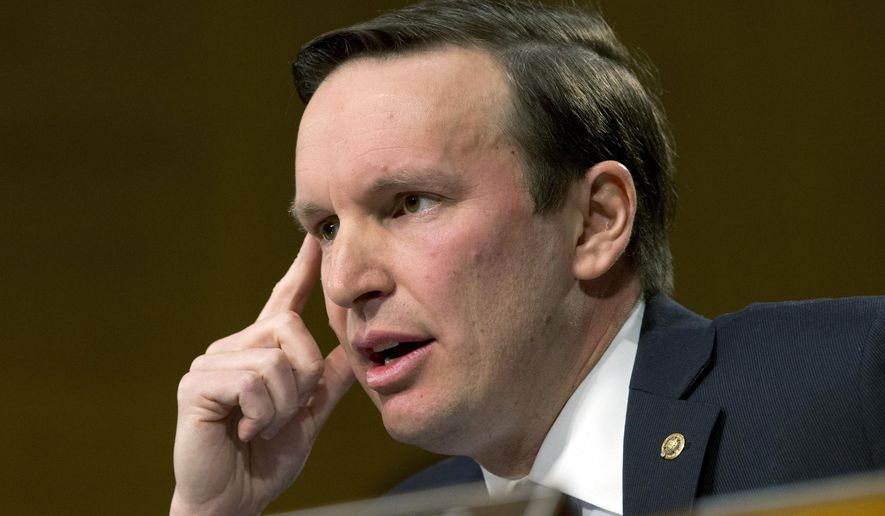A pair of Senate Democrats introduced a bill Wednesday that allows working-age Americans to buy into Medicare, a proposal that inches toward a single-payer system without fully embracing a government-run system in a pivotal election year.
Sens. Chris Murphy of Connecticut and Jeff Merkley of Oregon said the Choose Medicare Act is a good way to help individuals and businesses who’ve been left behind by the Democrats’ own health law or employer-based markets.
Obamacare customers who qualify for subsidies could apply them to the Medicare alternative, offering the type of “public option” that Democrats shirked under President Obama in 2010.
“Medicare is the most popular, most cost-effective insurance plan in the country,” Mr. Murphy said. “Our theory of the case is that everyone in this country should have the ability to buy a Medicare plan. There’s really no reason for only people over 65 to have access to Medicare.”
Bipartisan efforts to stabilize the 2010 program’s wobbly insurance exchanges fell apart earlier this year, leaving states and enrollees to brace for limited choices and premiums hikes ushered in by flaws in the law itself and GOP efforts to dismantle it.
President Trump says consumers need relief from heavy government mandates and regulations, not more federal involvement in health care.
Yet Democrats are running in the opposite direction, buoyed by the GOP’s failure to repeal and replace Obamacare and polling that suggests much of the American public supports a bigger government role in covering people.
Sen. Bernie Sanders of Vermont and 2020 Democratic hopefuls say it’s time to go bold, pitching a “Medicare for all” bill in which the federal government issues everyone an insurance card.
Republicans said the idea of a federal takeover of health care would cripple Democratic Senate candidates this fall.
“If Democrats think moving toward a government-run health care system will win over voters, they clearly haven’t been paying attention,” said Bob Salera, a spokesman for the National Republican Senatorial Committee.
House Democrats looking to retake the lower chamber after eight years in the minority see health care as the key to a “blue wave.” But colleagues across the Capitol face more of a high-wire act — 10 Senate Democrats are up for re-election in states Mr. Trump won in 2016.
“The issue that has got much of the Democratic base fired up is health care,” GOP strategist Ford O’Connell said. “But at the same time, they don’t want to give Republicans a chance to use it as a contrasting issue, to say, ‘Hey, look at how zany the Democrats are.’”
Democratic sponsors of the Medicare opt-in acknowledged the intra-party divide on health strategy — Mr. Merkley gladly sponsored Mr. Sanders’ sweeping bill, while Mr. Murphy did not.
They said their bill offers a middle ground that both sides can agree on, as the party tries to use its momentum on health care to spark a debate about how far the party is willing to go beyond Obamacare in the coming years.
“It lets consumers and businesses decide whether they want to migrate to a Medicare plan or whether they want to stay on private insurance,” Mr. Murphy said. He said the bill will save money in the long run because it will let Medicare set competitive rates and negotiate drug prices.
Taxpayer subsidies that Obamacare customers use to knock down their premiums would decrease as a result, sponsors said, so they propose using those savings to offer subsidies to people making up to six times the federal poverty level. The Affordable Care Act caps the assistance at people making 400 percent of poverty.
For now, the bill is more aspirational than functional. It joins a series of bills that go beyond Obamacare’s original design, as Democrats try to line up options if they retake parts of Congress in 2019 or the White House in 2021.
Sen. Brian Schatz, Hawaii Democrat, has proposed a bill that would allow people to buy into Medicaid, while Sen. Tim Kaine of Virginia has proposed a more limited Medicare buy-in on the state-based exchanges, starting in areas with few or no options.
Each of the bills would go beyond Obamacare’s more limited structure, which relied on federal regulations and subsidies to give the sick and needy a leg up in the private marketplace.
“There was unfinished business when we passed the Affordable Care Act,” Mr. Murphy said. “This is the public option on steroids.”
• Tom Howell Jr. can be reached at thowell@washingtontimes.com.




Please read our comment policy before commenting.